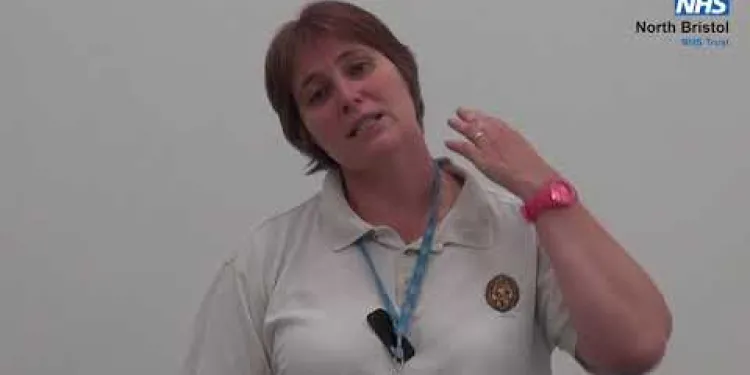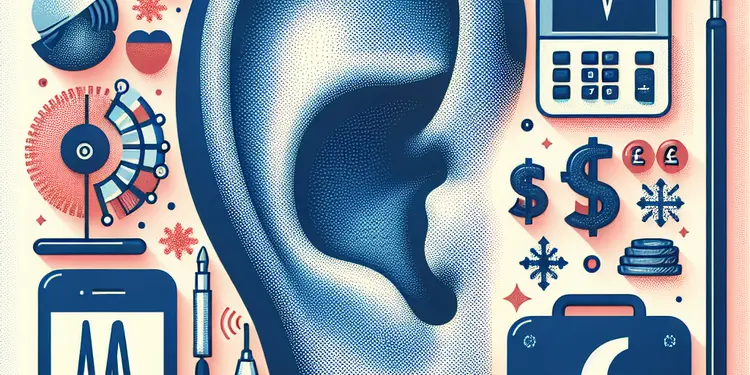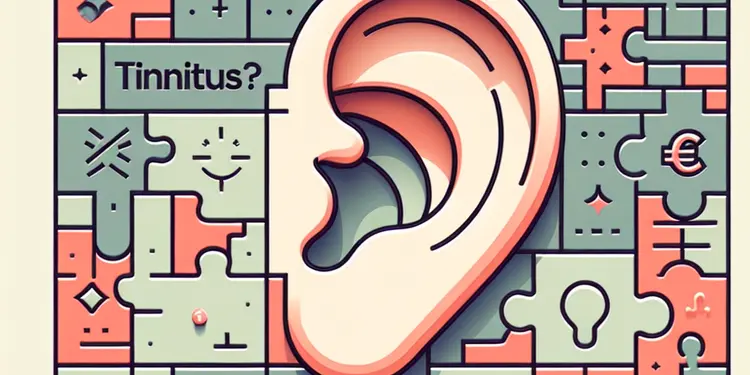Find Help
More Items From Ergsy search
-

Labyrinthitis and Vertigo (BPPV): Hazel's story | NHS
Relevance: 100%
-

Labyrinthitis and Vertigo (BPPV): Hazel's story | NHS
Relevance: 99%
-

Neck Exercises
Relevance: 5%
-

Can tinnitus be a symptom of a more serious condition?
Relevance: 5%
-

What are the symptoms of methanol poisoning?
Relevance: 5%
-

Are there any complications associated with shingles?
Relevance: 5%
-

What causes tinnitus?
Relevance: 2%
Labyrinthitis and Vertigo (BPPV): Hazel's Story
Introduction
Labyrinthitis and benign paroxysmal positional vertigo (BPPV) are two common causes of vertigo, a sensation of spinning or dizziness. Hazel, a 45-year-old woman from Manchester, shares her journey of diagnosis and treatment, providing valuable insights for others in the UK facing similar challenges.
What is Labyrinthitis?
Labyrinthitis is an inner ear infection that causes inflammation of the labyrinth, a structure in the inner ear that helps control balance. Symptoms include dizziness, hearing loss, and a feeling of vertigo, especially when moving the head.
Understanding BPPV
Benign paroxysmal positional vertigo (BPPV) is a disorder arising from a problem within the inner ear. It causes brief episodes of mild to intense dizziness, often triggered by changes in head position. BPPV occurs when tiny calcium particles clump up in the canals of the inner ear.
Hazel's Initial Symptoms
Hazel first noticed symptoms when she experienced sudden dizziness and a spinning sensation while getting out of bed one morning. This was accompanied by nausea and a ringing in her ears. Concerned, she visited her GP, suspecting an ear infection or a more serious condition.
Medical Consultation and Diagnosis
Hazel's GP referred her to an ENT specialist, who conducted various tests including a hearing test and a balance assessment. The results confirmed that Hazel was indeed suffering from labyrinthitis, coupled with episodes of BPPV.
Hazel's Treatment Journey
Hazel's treatment involved a combination of anti-inflammatory medications, vestibular rehabilitation exercises, and the Epley manoeuvre, a series of head movements designed to reposition the calcium particles in the inner ear. These treatments, provided by NHS healthcare professionals, greatly improved her symptoms over time.
Recovery and Management
Over a few months, Hazel's symptoms gradually diminished. She continues to do vestibular exercises and takes care to avoid sudden head movements. Hazel's story highlights the importance of early diagnosis, appropriate treatment, and ongoing management in dealing with labyrinthitis and BPPV.
Conclusion
Hazel's experience with labyrinthitis and BPPV underscores the importance of seeking medical advice if you experience symptoms of vertigo. The NHS offers comprehensive care and treatment options tailored to each individual's needs, ensuring patients like Hazel can regain their quality of life.
Labyrinthitis and Vertigo (BPPV): Hazel's Story
Introduction
Labyrinthitis and BPPV are two illnesses that make you feel dizzy or like you are spinning. Hazel, a lady from Manchester, tells us about how she found out she had these illnesses and how she got better. This can help other people in the UK who feel the same way.
What is Labyrinthitis?
Labyrinthitis is when a part of the inner ear gets infected and swollen. This part helps us keep our balance. You might feel dizzy, lose some hearing, or feel like you are spinning, especially when you move your head.
Understanding BPPV
BPPV is a problem in the inner ear. It makes you feel dizzy for a short time, usually when you move your head. BPPV happens because tiny bits of calcium move around in your inner ear.
Hazel's Initial Symptoms
Hazel first felt dizzy and like the room was spinning when she got out of bed one morning. She also felt sick and heard ringing in her ears. She went to see her doctor because she thought she had an ear infection or something serious.
Medical Consultation and Diagnosis
Hazel's doctor sent her to a special ear doctor. The ear doctor did tests to check her hearing and balance. They found out Hazel had labyrinthitis and BPPV.
Hazel's Treatment Journey
Hazel's treatment included medicine to reduce swelling, special exercises for balance, and the Epley manoeuvre. The Epley manoeuvre is a way to move your head to help the inner ear. The NHS doctors and nurses helped Hazel feel much better.
Recovery and Management
After a few months, Hazel's symptoms got better. She keeps doing exercises for balance and tries not to move her head too quickly. Hazel's story shows it's important to see a doctor early, get the right treatment, and keep managing these illnesses.
Conclusion
Hazel's story tells us how important it is to see a doctor if you feel dizzy or like you're spinning. The NHS can help with care and treatment made just for you, so you can feel better like Hazel did.
Frequently Asked Questions
What is labyrinthitis?
Labyrinthitis is an inner ear infection that affects your balance and hearing. It usually results from a viral infection and can cause dizziness, hearing loss, and vertigo.
What are the common symptoms of labyrinthitis?
Common symptoms of labyrinthitis include dizziness, vertigo, hearing loss, and a feeling of pressure or fullness in the ear. Some may also experience nausea and vomiting.
How is labyrinthitis diagnosed?
Labyrinthitis is diagnosed based on your symptoms, a physical examination, and sometimes hearing tests or imaging studies like an MRI may be ordered to rule out other conditions.
What is vertigo?
Vertigo is a sensation that you or the environment around you is moving or spinning. It's often a symptom of an inner ear problem like labyrinthitis or Benign Paroxysmal Positional Vertigo (BPPV).
What is Benign Paroxysmal Positional Vertigo (BPPV)?
BPPV is a disorder arising in the inner ear, causing short episodes of vertigo triggered by changes in head position. It's one of the most common causes of vertigo.
How long does labyrinthitis last?
The acute symptoms of labyrinthitis typically last for a few days to a few weeks, but some symptoms like dizziness and unsteadiness can persist for months in some cases.
Can labyrinthitis be treated?
Yes, treatment for labyrinthitis often includes medications to relieve symptoms such as dizziness and nausea. In some cases, antibiotics may be prescribed if a bacterial infection is suspected.
Is BPPV curable?
Yes, BPPV can often be effectively treated with a series of head movements known as the Epley maneuver or other repositioning techniques performed by a healthcare professional.
Can labyrinthitis cause permanent hearing loss?
In most cases, any hearing loss associated with labyrinthitis is temporary. However, in rare instances, it may result in permanent hearing damage.
What lifestyle changes can help manage labyrinthitis?
Rest, avoiding sudden movements, staying hydrated, and avoiding alcohol or caffeine can help manage symptoms. Vestibular rehabilitation exercises may also be recommended.
What triggers BPPV?
BPPV is often triggered by changes in head position, such as rolling over in bed, looking up or down, or getting up quickly. It can be exacerbated by head injury or prolonged bed rest.
How can I prevent labyrinthitis?
While it's difficult to prevent labyrinthitis entirely, maintaining good general health, managing infections promptly, and avoiding smoking can reduce risk factors.
What should I do if I experience severe vertigo?
If you experience severe vertigo, you should lie down in a quiet, dark room until the symptoms pass. Seek medical advice if the symptoms are prolonged or accompanied by severe headache, fever, or vision changes.
Can physical therapy help with labyrinthitis or BPPV?
Yes, vestibular rehabilitation therapy, performed by a physiotherapist, can help improve balance and reduce symptoms of dizziness from labyrinthitis or BPPV.
Should I avoid driving if I have labyrinthitis or BPPV?
Yes, you should avoid driving or operating heavy machinery if you are experiencing symptoms of vertigo or dizziness, as these can impair your ability to drive safely.
What is labyrinthitis?
Labyrinthitis is when the inside of your ear gets swollen. This can make you feel dizzy and off-balance. It might feel like the room is spinning. If you have these feelings, it is good to see a doctor.
To help with reading:
- Use a ruler or your finger to keep your place.
- Read slowly, one sentence at a time.
- Ask someone to read with you.
Labyrinthitis is an illness in your inner ear. It makes it hard for you to balance and hear. This happens because of a virus. You might feel dizzy, lose some hearing, or feel like the room is spinning (this is called vertigo).
What are the signs of labyrinthitis?
Labyrinthitis is when part of your ear inside feels swollen or sick. Here are some signs you might have:
- Feeling dizzy or like things are spinning around you.
- Hearing a noise that isn’t there, like buzzing or ringing.
- Trouble hearing things clearly.
- Feeling sick to your stomach.
- Trouble with balancing.
If you think you have labyrinthitis, tell an adult or a doctor. They can help you feel better.
Labyrinthitis is when our ear gets sick. It can make us feel dizzy and like the room is spinning. This is called vertigo. Our hearing might not be as good, and our ear might feel full or like it has pressure. Some people might feel sick to their stomach and might throw up.
Here are some tips to help: - Sit or lie down if you feel dizzy. - Move slowly and carefully. - Use a cane or hold on to furniture when walking if needed. - Have someone with you if you need help. If you feel very sick, ask a grown-up or a doctor for help.How do doctors find out if you have labyrinthitis?
Doctors find out if you have labyrinthitis by looking at your symptoms and checking your body. Sometimes, they might do a hearing test or take pictures of your brain (like an MRI) to make sure it's not something else.
What is vertigo?
Vertigo is when you feel dizzy. It seems like you or the things around you are spinning, even if they are not moving. This can make you feel unsteady.
If you want help, you can try sitting down or holding onto something steady until it passes. You can also talk to a grown-up or doctor for more advice.
Vertigo is when you feel like you or the things around you are moving or spinning. It can happen because of a problem inside your ear, like labyrinthitis or something called Benign Paroxysmal Positional Vertigo (BPPV).
What is Benign Paroxysmal Positional Vertigo (BPPV)?
BPPV is a problem in the inner ear.
BPPV causes dizziness.
It can happen when you move your head.
If you have BPPV, you might feel like the room is spinning.
Ask a doctor for help if you feel dizzy a lot.
Use pictures or videos to understand better.
Talk with someone who knows about ears and balance.
BPPV is a problem in the inside of the ear. It makes you feel dizzy for a short time when you move your head. It's a common reason why people feel dizzy.
How long does labyrinthitis last?
Labyrinthitis is when the inside of your ear is swollen.
It can make you feel dizzy.
Most people feel better in a few weeks.
If you are still feeling bad, a doctor can help.
Some people listen to calm music to feel better.
Labyrinthitis can make you feel very dizzy and unsteady for a few days or weeks. Sometimes, people can still feel a little dizzy and wobbly for a few months after.
Here are some ways to help:
- Rest in a quiet and dark room.
- Get up slowly, especially when you’ve been lying down.
- Try to focus on a fixed point when you feel dizzy.
Can labyrinthitis be treated?
Yes, labyrinthitis can be treated. Labyrinthitis is when your inner ear gets sore. It can make you feel dizzy and unwell.
If you feel dizzy or sick, tell your doctor. They can give you medicine to help.
Here are some things that might help you feel better:
- Rest in a quiet, dark room.
- Move slowly and be careful when walking.
- Drink lots of water, but take small sips.
Ask someone to help you if you feel very dizzy.
Remember to talk to a doctor. They can help you feel better.
Yes, when someone has labyrinthitis, doctors often give them medicine. This medicine helps with feeling dizzy and sick in the tummy. If doctors think the problem is because of germs, they might give medicine to fight the germs, called antibiotics.
Can BPPV be fixed?
BPPV is a problem in your ear that makes you feel dizzy.
The good news is, BPPV can often be fixed. You might need to see a doctor.
The doctor can help with exercises or treatments to make you feel better.
If you feel dizzy, tell an adult or go see a doctor for help.
Use pictures or videos to understand more.
Yes, BPPV can often be treated well with head movements. These movements are called the Epley maneuver. A healthcare worker can help do these or other movements.
Can labyrinthitis make hearing go away forever?
Labyrinthitis is when the inside part of your ear gets swollen. This can make you feel dizzy and your hearing can get worse. Most of the time, your hearing gets better when labyrinthitis goes away. But sometimes, it can make your hearing go away forever. It's important to see a doctor if you think you have labyrinthitis. They can help you feel better and take care of your ears. If you have trouble understanding, you can ask someone to help you read or use pictures. You can also listen to information instead of reading it.Most of the time, people get better from hearing loss when they have labyrinthitis. But, sometimes in rare cases, the hearing loss can be permanent and won't go away.
How can you change your daily life to help with labyrinthitis?
Here are some simple things you can do:
- Get plenty of rest. Rest helps your body heal.
- Drink lots of water. Staying hydrated is good for you.
- Avoid loud noises. Loud sounds can make symptoms worse.
- Move slowly. Standing up or moving quickly might make you dizzy.
- Try relaxation exercises. Breathing deeply can help you feel calm.
You can use helpful tools like:
- Voice assistant apps to read things aloud to you.
- Relaxing music to help you stay calm.
Rest and don't move too quickly. Drink lots of water. Don't drink alcohol or coffee. This can make you feel better. Doing special exercises can also help. These exercises are called vestibular rehabilitation.
What causes BPPV?
BPPV is when you feel dizzy because tiny stones in your ear move where they shouldn't be.
Here are some things that can make BPPV happen:
- Getting older.
- Hitting your head.
- Sleeping with your head in the same position for a long time.
If you feel dizzy, it is a good idea to talk to a doctor.
You can also try using pictures or videos to understand BPPV better.
BPPV can happen when you move your head. This can be when you roll over in bed, look up or down, or stand up fast. A hit to the head or staying in bed for a long time can make it worse.
How can I stop labyrinthitis?
It's hard to stop labyrinthitis completely, but there are some ways to help keep it away. Stay healthy, see a doctor if you get sick, and do not smoke. This can make you less likely to get it.
What should I do if I feel very dizzy?
If you feel like the world is spinning and you can't stand up: - Sit or lie down right away. - Close your eyes and breathe slowly. - If it doesn't stop, call an adult or a doctor. - Use a chair or wall for support when walking. - Try to rest in a quiet place. Remember, you are not alone, and help is there if you need it!If you feel very dizzy, lie down in a quiet, dark room until the feeling goes away. Ask a doctor for help if it lasts a long time or if you also have a bad headache, fever, or trouble seeing.
Can exercises help with ear balance problems?
Sometimes people feel dizzy because their inner ear isn't working right. This can happen with things called labyrinthitis or BPPV. There are special exercises that can help you feel better and more steady. These exercises are like little workouts for your balance.
If you're feeling dizzy, a doctor or therapist can show you how to do these exercises. They will guide you step-by-step, so it is safe and helpful. You can also try helpful tools like balance boards or apps that show you exercises. Always be careful and ask an adult or doctor if you're unsure.
Yes, a kind of therapy called vestibular rehabilitation can help.
A special doctor called a physiotherapist does this therapy.
The therapy can help you balance better and feel less dizzy if you have labyrinthitis or BPPV.
Is it safe to drive if I have labyrinthitis or BPPV?
If you have labyrinthitis or BPPV, it can make you feel dizzy. Feeling dizzy can make driving unsafe.
Here are some tips to help you:
- Talk to your doctor. They can give you advice.
- Rest until you feel better.
- Try not to drive if you feel dizzy or unwell.
- Ask a friend or family member to help you if you need to go somewhere.
If you feel dizzy or have the spins, it is best not to drive or use big machines. Being dizzy can make it hard to drive safely.
Useful Links
This website offers general information and is not a substitute for professional advice.
Always seek guidance from qualified professionals.
If you have any medical concerns or need urgent help, contact a healthcare professional or emergency services immediately.
Some of this content was generated with AI assistance. We’ve done our best to keep it accurate, helpful, and human-friendly.
- Ergsy carfully checks the information in the videos we provide here.
- Videos shown by Youtube after a video has completed, have NOT been reviewed by ERGSY.
- To view, click the arrow in centre of video.
- Most of the videos you find here will have subtitles and/or closed captions available.
- You may need to turn these on, and choose your preferred language.
- Go to the video you'd like to watch.
- If closed captions (CC) are available, settings will be visible on the bottom right of the video player.
- To turn on Captions, click settings .
- To turn off Captions, click settings again.
More Items From Ergsy search
-

Labyrinthitis and Vertigo (BPPV): Hazel's story | NHS
Relevance: 100%
-

Labyrinthitis and Vertigo (BPPV): Hazel's story | NHS
Relevance: 99%
-

Neck Exercises
Relevance: 5%
-

Can tinnitus be a symptom of a more serious condition?
Relevance: 5%
-

What are the symptoms of methanol poisoning?
Relevance: 5%
-

Are there any complications associated with shingles?
Relevance: 5%
-

What causes tinnitus?
Relevance: 2%

